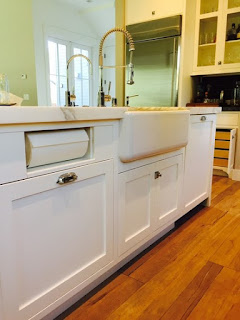Shaker Style Still a Cabinetry Classic
by Gabrielle
Di Stefano
The Shaker profile stays true to its
generations-old
square simplicity but can adapt to any modern taste
square simplicity but can adapt to any modern taste
From industrial to contemporary to country, the recessed Shaker
panel offers numerous possibilities. At the heart of the Shaker movement were
the ideals of plainness, practicality and pride, which reflect strongly in
their distinctive furniture. The stability and harmony this cabinetry brings to
all styles of spaces make it a classic favorite among cabinetry profiles.
 Characteristics. True Shaker cabinetry can seem quite plain in its squareness, due to
the frame and panel profile, also known as rail and stile construction. Many
variations of the original design have come about since the 1800s, when the
Shaker community was in full force. In larger units, the panel can be divided
into one or more sections by using pieces known as mid-rails, mid-stiles or muntins.
Characteristics. True Shaker cabinetry can seem quite plain in its squareness, due to
the frame and panel profile, also known as rail and stile construction. Many
variations of the original design have come about since the 1800s, when the
Shaker community was in full force. In larger units, the panel can be divided
into one or more sections by using pieces known as mid-rails, mid-stiles or muntins.By choosing the best quality wood they could muster — such as maple, birch and chestnut — the Shaker craftsmen could focus on the functionality of the design and let the timber speak for itself. Walnut timber achieves a flawless look in this kitchen, although this is a much richer looking timber than what was used in their day.
 Style. Repetition was king to the Shaker craftsman. Built-in cabinets and
drawers create a clean, orderly look. Today, many kitchens have rows of big
drawers, which look great with this cabinetry profile.
Style. Repetition was king to the Shaker craftsman. Built-in cabinets and
drawers create a clean, orderly look. Today, many kitchens have rows of big
drawers, which look great with this cabinetry profile.While the very squared-off rail and stile tends to be the purist approach to the Shaker door, giving the edges a slight bevelled finish has become more popular. This small but effective detail adds a new twist to any kitchen space.
Finishes for Shaker
Cabinets

Painted finish. This offers a more contemporary look, allowing you to keep the sharp, squared-off and recessed edges that make the cabinetry intrinsically Shaker. Depending on the type of timber, you may start to see hairline cracks at the joints as wood naturally expands and contracts over time, but this generally does not compromise the door's strength.
Burnished finish. Applied after this unit was painted, a burnished finish gives it
an aged look. Each cabinet is distressed, sanded and then applied with a
burnishing stain. This can be a complex treatment, so think it through and discuss
the options.
Thermofoil finish. Thermofoil, also known as vinyl wrap, adds durability to kitchen cabinetry. Thermofoil laminate is applied to medium-density fiberboard (MDF) using an intense heat and pressure-bonding process.
Keep in mind that where the panel meets the rail and stile on Shaker cabinetry, Thermofoil will not get as sharp an edge as a painted or stained timber door. The machine used to apply the laminate can't reach right into the corners, so it angles the edge of the stile and rail.
Polyurethane finish. The Shaker profile used on the island bench cabinets is the real hero
in this pared-down, industrial kitchen. The matte polyurethane finish on this
reclaimed white oak timber enhances the grain, knots and streaks. It's a
terrific example of how timeless this cabinetry can be.
Cost. This is always a big factor when renovating, especially if your
room needs built-ins. If you have your heart set on the timber look, why not
combine a veneer with a painted finish?
The Shaker profile tends to be in the mid-price range, since there's no
additional molding, but it does require more work than a simple slab door. Of
course, this also depends on the materials used. MDF tends to be the least
expensive option, then Thermofoil, while painted finishes and solid timbers are
in a higher price range.
Check out the Shaker door style cabinetry at Cabinet-S-Top's designer showroom located at 1977 Medina Road, Medina, OH 44256. 330.239.3630 ~ www.cabinet-s-top.com






Comments
Post a Comment